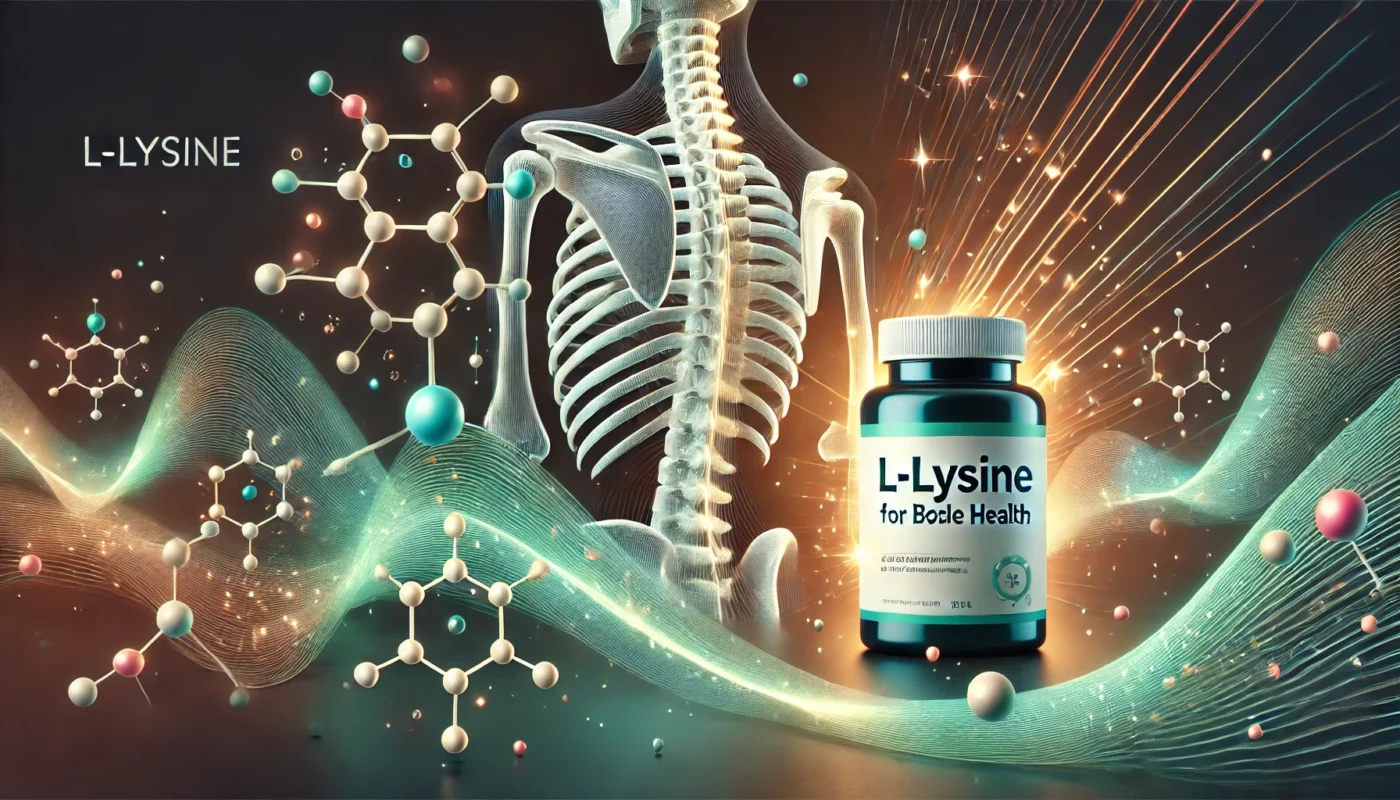In a world where health supplements are ubiquitous, distinguishing which nutrients can truly enhance your well-being is crucial. Among the array of vitamins, minerals, and amino acids, L-lysine has carved out a unique niche. This essential amino acid is fundamental to numerous physiological processes, yet it often doesn’t receive the recognition it deserves. By exploring its diverse roles and scientific backing, this article will explain why L-lysine is a vital addition to a balanced supplement plan.
You May Also Like:
L-lysine and Skin Repair: A Natural Solution for Scars and Wrinkles
L-lysine for Stress Relief and Mental Clarity: What the Studies Say
L-lysine: The Key to Optimizing Your Health Supplement Routine is an original (HSLHealing) article.
Understanding L-lysine and Its Biological Importance
L-lysine is one of nine essential amino acids, meaning it cannot be synthesized by the body and must be acquired through diet or supplementation. Known as a cornerstone for protein synthesis, L-lysine is involved in tissue repair, nutrient metabolism, and enzyme production.
L-lysine also plays a role in producing carnitine, a compound that converts fatty acids into energy, and in the absorption of calcium, which supports bone health. Without sufficient levels, individuals can experience fatigue, susceptibility to infections, and slower recovery from injuries.

The Immune System and L-lysine: A Powerful Ally
L-lysine is particularly renowned for its antiviral properties, especially its role in combating the herpes simplex virus (HSV). Research in Alternative Medicine Review demonstrated that individuals supplementing with L-lysine (1,000–3,000 mg daily) experienced a significant reduction in the recurrence and severity of cold sores. L-lysine is believed to suppress arginine—a competing amino acid necessary for HSV replication—thereby curbing viral activity.
In addition to its antiviral benefits, L-lysine modulates inflammatory pathways. A study published in Amino Acids highlights its ability to regulate the expression of cytokines, signaling molecules that influence immune response. This makes L-lysine particularly beneficial for individuals managing chronic inflammation or those prone to viral infections.
Optimizing Bone Health: L-lysine and Calcium Metabolism
Calcium metabolism relies heavily on L-lysine, which enhances calcium absorption in the gut and reduces its excretion through urine. A study in Metabolism: Clinical and Experimental found that individuals who supplemented with L-lysine and calcium demonstrated improved markers of bone density compared to those taking calcium alone.
This amino acid’s influence on bone health is particularly crucial for postmenopausal women and older adults, who are at greater risk of osteoporosis. By supporting calcium retention, L-lysine helps mitigate bone loss and maintain skeletal strength.

Muscle Repair and Athletic Recovery
For athletes and active individuals, amino acids are indispensable. L-lysine is particularly effective in promoting muscle repair after intense physical activity. A clinical trial in Nutrition Research observed that participants supplementing with L-lysine and other essential amino acids experienced enhanced muscle protein synthesis and reduced markers of muscle damage.
Moreover, L-lysine facilitates nitrogen balance, a critical factor in preventing muscle breakdown during strenuous exercise. Its ability to boost collagen production also strengthens connective tissues like tendons and ligaments, reducing the risk of injury.

Skin Health and Collagen Formation
Collagen, the most abundant protein in the human body, is essential for skin elasticity, wound healing, and overall tissue integrity. L-lysine serves as a precursor to collagen synthesis, ensuring that the body can repair and maintain healthy skin and connective tissues.
A randomized controlled trial published in Clinical, Cosmetic and Investigational Dermatology found that supplementation with L-lysine and vitamin C significantly improved skin hydration and reduced fine lines after 12 weeks. For individuals struggling with acne scars or skin conditions requiring enhanced healing, L-lysine supplementation can provide substantial benefits.
Mental Health and Stress Resilience
The relationship between L-lysine and mental health is an emerging area of research. Studies indicate that L-lysine can influence neurotransmitter activity, particularly serotonin, which plays a critical role in mood regulation.
A landmark study in Proceedings of the National Academy of Sciences found that individuals consuming a diet supplemented with L-lysine exhibited reduced cortisol levels and improved symptoms of anxiety. By modulating the body’s stress response, L-lysine may help mitigate the physiological effects of chronic stress, such as high blood pressure and fatigue.
Additionally, the same study revealed that L-lysine supplementation improved serotonin receptor sensitivity in the brain, suggesting potential applications in managing depression and other mood disorders.

L-lysine and Cardiovascular Health
Cardiovascular health is another area where L-lysine shows promise. This amino acid is a key component in the production of carnitine, which facilitates the breakdown of fatty acids into energy and reduces the accumulation of harmful lipids in the blood.
Research in Experimental and Clinical Cardiology highlighted the potential of L-lysine and carnitine supplementation in improving lipid profiles and reducing arterial stiffness, key markers of cardiovascular health. For individuals managing conditions like hyperlipidemia or hypertension, L-lysine may serve as a complementary therapy.

Dietary Sources and Supplementation
While L-lysine is found in high-protein foods, such as meat, poultry, fish, eggs, and dairy, vegetarians and vegans often struggle to meet their lysine needs through diet alone. Plant-based sources like legumes, quinoa, and lentils contain lysine but in lower concentrations.
For those unable to achieve sufficient intake through diet, L-lysine supplements offer a practical solution. These are typically available in 500 mg to 1,000 mg doses, with daily supplementation of 1,000–3,000 mg considered safe and effective for most individuals.
Who Can Benefit Most from L-lysine?
Certain populations are more likely to benefit from L-lysine supplementation:
- Athletes: For muscle recovery and injury prevention.
- Older Adults: To support bone health and prevent collagen loss.
- Vegans and Vegetarians: To bridge dietary gaps in lysine intake.
- Individuals with HSV: To reduce cold sore outbreaks.
- Stress-prone Individuals: To mitigate anxiety and cortisol levels.
Empower your health—L-Lysine promotes optimal hormone function and stability—Shop Now on Amazon!

Safety and Potential Side Effects
L-lysine is generally well-tolerated, but excessive intake (above 6,000 mg per day) can cause gastrointestinal discomfort in some individuals. Those with pre-existing kidney or liver conditions should consult a healthcare provider before starting supplementation, as their ability to process amino acids may be impaired.
Conclusion: Elevating Your Supplement Routine with L-lysine
L-lysine’s broad spectrum of benefits, supported by extensive research, makes it a cornerstone of any well-rounded supplement plan. From bolstering immune defenses and supporting bone health to enhancing mental clarity and skin vitality, this essential amino acid addresses a diverse array of health concerns.
For those seeking to optimize their overall well-being, integrating L-lysine into your health regimen is not just beneficial—it’s essential. Whether through dietary sources or high-quality supplements, prioritizing L-lysine can help unlock your body’s full potential.

References
- Oral treatment with L-lysine and L-arginine reduces anxiety and basal cortisol levels in healthy humans. Retrieved from: https://pubmed.ncbi.nlm.nih.gov/17510493/
- Dietary L-lysine deficiency increases stress-induced anxiety and fecal excretion in rats. Retrieved from: https://pubmed.ncbi.nlm.nih.gov/12468617/
- Lysine post-translational modifications of collagen. Retrieved from: https://pmc.ncbi.nlm.nih.gov/articles/PMC3499978/
- Lysine Stimulates Protein Synthesis by Promoting the Expression of ATB0,+ and Activating the mTOR Pathway in Bovine Mammary Epithelial Cells. Retrieved from: https://pubmed.ncbi.nlm.nih.gov/30184226/
- Use of amino acids as growth hormone-releasing agents by athletes. Retrieved from: https://pubmed.ncbi.nlm.nih.gov/12093449/
- Calcium supplementation in postmenopausal women to reduce the risk of osteoporotic fractures. Retrieved from: https://pubmed.ncbi.nlm.nih.gov/21289325/
- Effect of Dietary Amino Acids L-Arginine and Lysine on Implant Osseointegration. Retrieved from: https://pmc.ncbi.nlm.nih.gov/articles/PMC9469227/
Important Note: The information contained in this article is for general informational purposes only, and should not be construed as health or medical advice, nor is it intended to diagnose, prevent, treat, or cure any disease or health condition. Before embarking on any diet, fitness regimen, or program of nutritional supplementation, it is advisable to consult your healthcare professional in order to determine its safety and probable efficacy in terms of your individual state of health.
Regarding Nutritional Supplements Or Other Non-Prescription Health Products: If any nutritional supplements or other non-prescription health products are mentioned in the foregoing article, any claims or statements made about them have not been evaluated by the U.S. Food and Drug Administration, and such nutritional supplements or other health products are not intended to diagnose, treat, cure, or prevent any disease.

